- Home
- Sarah Dessen
Saint Anything Page 2
Saint Anything Read online
Page 2
“It just seems like we might have a case,” she said to my dad later that morning. She was dressed now, all business: they had a meeting with Peyton’s lawyer at nine a.m. sharp. “I mean, did you see those wounds? What about police brutality?”
“Julie, he was running from them,” my dad replied in a tired voice.
“Yes, I understand that. But I also understand that he is still a minor, and force was not necessary. There was a fence. It’s not like he was going anywhere.”
But he was, I thought, although I knew better than to say this aloud. The more Peyton got into trouble, the more my mom seemed desperate to blame anyone and everyone else. The school was out to get him. The cops were too rough. But my brother was no innocent: all you had to do was look at the facts. Although sometimes, I felt like I was the only one who could see them.
By the next day at school, word had spread, and I was getting side-eyed all over the hallways. It was decided that Peyton would withdraw from Perkins Day and finish high school elsewhere, although opinions differed on whether it was the school or my parents who made this choice.
I was lucky to have my friends, who rallied around me, letting people know that I was not my brother, despite our shared looks and last name. Jenn, whom I’d known since our days at Trinity Church Preschool, was especially protective. Her dad had had his own tangles with the law, back in college.
“He was always honest about it, that it was just experimentation,” she told me as we sat in the cafeteria at lunch. “He paid his debt to society, and now look, he’s a CEO, totally successful. Peyton will be, too. This, too, shall pass.”
Jenn always sounded like this, older than she was, mostly because her parents had had her in their forties and treated her like a little adult. She even looked like a grown-up, with her sensible haircut, glasses, and comfortable footwear. At times it was strange, like she’d skipped childhood altogether, even when she was in it. But now, I was reassured. I wanted to believe her. To believe anything.
Peyton received three months in jail and a fine. That was the first time we were all in court together. His lawyer, Sawyer Ambrose, whose ads were on bus stops all over town (NEED A LAWYER? CALL ON SAWYER!), maintained that it was crucial for the jury to see us sitting behind my brother like the loyal, tight family we were.
Also present was my brother’s new best friend, a guy he’d met in the Narcotics Anonymous group he was required to attend. Ames was a year older than Peyton, tall with shaggy hair and a loping walk, and had gotten busted for dealing pot a year earlier. He’d served six months and stayed out of trouble ever since, setting the kind of example everyone agreed my brother needed. They drank a lot of coffee drinks together, played video games, and studied, Peyton with his books from the alternative school where he’d landed, Ames for the classes he was taking in hospitality management at Lakeview Tech. They planned that Peyton would do the same once he got his diploma, and together they’d go work at one resort or another. My mom loved this idea, and already had all the paperwork necessary to make it happen: it sat in its own labeled envelope on her desk. There was just the little matter of the jail thing to get out of the way first.
My brother ended up serving seven weeks at the county lockup. I was not permitted to see him, but my mother visited every time it was allowed. Meanwhile, Ames remained; it seemed like he was always parked at our kitchen table with a coffee drink, ducking out occasionally to the garage to smoke cigarettes, using a sand-bucket ashtray my mom (who abhorred the habit) put out there just for him. Sometimes he showed up with his girlfriend, Marla, a manicurist with blonde hair, big blue eyes, and a shyness so prevalent she rarely spoke. If you addressed her, she got super nervous, like a small dog too tightly wound and always shaking.
I knew Ames was a comfort to my mom. But something about him made me uneasy. Like how I’d catch him watching me over the rim of his coffee cup, following my movements with his dark eyes. Or how he always found a way to touch me—squeezing my shoulder, brushing against my arm—when he said hello. It wasn’t like he’d ever done anything to me, so I felt like it had to be my problem. Plus, he had a girlfriend. All he wanted, he told me again and again, was to take care of me the way Peyton would.
“It was the one thing he asked me the day he went in,” he told me soon after my brother was gone. We were in the kitchen, and my mom had stepped out to take a phone call, leaving us alone. “He said, ‘Look out for Sydney, man. I’m counting on you.’”
I wasn’t sure what to say to this. First of all, it didn’t sound like Peyton, who’d barely given me the time of day in the months before he’d gone away. Plus, even before that, he’d never been the protective type. But Ames knew my brother well, and the truth was that I no longer did. So I had to take his word for it.
“Well,” I said, feeling like I should offer something, “um, thanks.”
“No problem.” He gave me another one of those long looks. “It’s the least I can do.”
When Peyton was released, he was still quiet, but more engaged, helping out more around the house and being present in a way he hadn’t been in the previous months. Sometimes, after he got home from school, he’d even watch TV with me. He could only stand Big New York or Miami for short periods, though, before getting disgusted with every single character.
“That’s Ayre,” I’d try to explain as the gaunt, heavily nipped-and-tucked one-time Playmate had yet another meltdown. “She and Rosalie, the actress? They’re, like, always at each other.”
Peyton said nothing, only rolling his eyes. He had little patience for anything, I was noticing.
“You pick something,” I’d say, pushing the remote at him. “Seriously, I don’t care what we watch.”
But it never worked. It was like he could alight next to me for just so long before having to move on to checking e-mail, strumming his guitar, or getting something to eat. His fidgeting kept increasing, and it made me nervous. I saw my mom notice it as well. Like some kind of internal energy had lost its outlet and was just building up, day after day, until he found a new one.
He got his diploma in June, in a small ceremony with only eight classmates, most of whom had also been kicked out of their previous schools. We all attended, Ames and Marla included, and went out to dinner afterward at Luna Blu, one of our favorite restaurants. There, over their famous fried pickle appetizer, we toasted my brother with our soft drinks before my parents presented him with his graduation gift: two round-trip tickets to Jacksonville, Florida, so he and Ames could check out a well-known hospitality course there. My mom had even made them an appointment with the school’s director, as well as set up a private tour. Of course.
“This is great,” my brother said, looking down at the tickets. “Seriously. Thanks, Mom and Dad.”
My mother smiled, tears pricking her eyes, as my dad reached over, clapping Peyton on the shoulder. We were sitting outside on the patio, tiny fairy lights strung up overhead, and we’d just had a great meal together. The moment seemed so far away from the year we’d had, like everything in the fall and before it was just a bad dream. The next day, my mom sat down with me to talk about my hopes for college. Finally, I was the project. It was my turn.
That fall, I started tenth grade at Perkins Day. My own transition to Upper School the year before had been as unremarkable as my brother’s had been eventful. Jenn and I made friends with a new girl, Meredith, who’d moved to Lakeview to train at the U’s gymnastics facility. She was small and all muscle, with the best posture I’d ever seen, not to mention the perkiest ponytail. She’d been training for competition since she was six. I’d never met anyone so driven and disciplined, and she basically spent every hour she wasn’t at school in the gym. Together, we three formed an easy friendship, as we all felt a little older than our classmates: Jenn because of her upbringing, Meredith because of her sport, and me because of everything that had happened in the last year. My brother’s legend, for
better or worse, still preceded me. But my choice of friends—and the fact that we avoided all parties and illegal extracurriculars even as our classmates experimented—made it clear we were very different.
With Peyton working as a valet at a local hotel and taking his hospitality classes with Ames at Lakeview Tech, my dad doing more traveling, and my mom returning to her volunteer projects, I often had the house entirely to myself after school. I started to feel that sadness again, creeping up each afternoon as the sun went down. I tried to fill it with Big New York or Miami, watching back-to-back-to-back episodes until my eyes were bleary. Even so, I always felt a rush of relief when I heard the garage door opening, signaling someone’s return and the shift to dinner and nighttime, when I wouldn’t be by myself anymore.
Then, the day after Valentine’s Day, my brother left his job at the regular time, a little after ten p.m. Instead of coming home, however, he went to visit an old friend from Perkins Day. There, he drank several beers, took a few shots, and ignored the repeated calls from my mother until his voice mail was full. At two a.m., he left his friend’s apartment, got into his car, and headed home. At the same time, a fifteen-year-old boy named David Ibarra got onto his bike to ride the short distance back to his house from his cousin’s, where he’d fallen asleep on the couch while playing video games. He was taking a right from Dombey Street onto Pike Avenue when my brother hit him head-on.
I was awakened that day by the sound of my mother screaming. It was a primal, awful sound, one I had never heard before. For the first time I understood what it really meant to feel your blood run cold. I ran out of my room and down the stairs, then stopped just outside the kitchen, suddenly realizing I wasn’t sure I was ready for what was happening in there. But then my mom was wailing, and I made myself go in.
She was on her knees, her head bowed, my father crouching in front of her, his hands gripping her shoulders. The sound she was making was so awful, worse than an animal in pain. My first thought was that my brother was dead.
“Julie,” my dad was saying. “Breathe, honey. Breathe.”
My mom shook her head. Her face was white. Seeing my strong, capable mother this way was one of the scariest things I’d ever endured. I just wanted it to stop. So I made myself speak.
“Mom?”
My father turned, seeing me. “Sydney, go upstairs. I’ll be there in a minute.”
I went. I didn’t know what else to do. Then I sat on my bed and waited. Right then, it felt like time did stop, in that five minutes or fifteen, or however long it was.
Finally, my father appeared in the doorway. The first thing I noticed was how wrinkled his shirt was, twisted in places, like someone had been grabbing at it. Later, I’d remember this more than anything else. That plaid print, all disjointed.
“There’s been an accident,” he said. His voice sounded raw. “Your brother hurt someone.”
Later, I’d think back to these words and realize how telling they really were. Your brother hurt someone. It was like a metaphor, with a literal meaning and so many others. David Ibarra was the victim here. But he was not the only one hurt.
Peyton was at the police station, where they’d taken him after a Breathalyzer test had confirmed his blood alcohol level was twice the legal limit. But the DUI was the least of his problems. As he was still on probation, there would be no leniency this time and no bail, at least at first. My father called Sawyer Ambrose, then changed his shirt and left to meet him at the station. My mom went to her room and shut the door. I went to school, because I didn’t know what else to do.
“Are you sure you’re okay?” Jenn asked me at my locker right after homeroom. “You seem weird.”
“I’m fine,” I told her, shoving a book in my bag. “Just tired.”
I didn’t know why I wasn’t telling her. It was like this was too big; I didn’t want to give it any air to breathe. Plus, people would know soon enough.
I started getting texts that evening, around dinnertime. First Jenn, then Meredith, then a few other friends. I turned my phone off, picturing the word spreading, like drops of food coloring slowly taking over a glass of water. My mother was still in her room, my dad gone, so I made myself some macaroni and cheese, which I ate at the kitchen counter, standing up. Then I went to my room, where I lay on the bed, staring at the ceiling, until I heard the familiar sound of the garage door opening. This time, though, it didn’t make me feel better.
A few minutes later, I heard a knock on my door, and then my dad came in. He looked so tired, with bags under his eyes, like he’d aged ten years since I’d seen him last.
“I’m worried about Mom,” I blurted out before he could say anything. I hadn’t even been planning to say this; it was like someone else spoke in my voice.
“I know. She’ll be okay. Did you eat?”
“Yeah.”
He looked at me for a minute, then crossed the room, sitting down on the edge of my bed. My dad was not the touchy-feely type, never had been. He was a shoulder-clapper, a master of the quick, three-back-pat hug. It was my mom who was always pulling me into her lap, brushing a hand over my hair, squeezing me tight. But now, on this weirdest and scariest of days, my father wrapped his arms around me. I hugged him back, holding on for dear life, and we stayed like that for what felt like a long time.
There was so much ahead of us, both awfully familiar and, even worse, brand-new. My brother would never be the same. I’d never have another day when I didn’t think of David Ibarra at least once. My mom would fight on, but she had lost something. I’d never again be able to look at her and not see it missing. So many nevers. But in that moment, I just held my dad and squeezed my eyes shut, trying to make time stop again. It didn’t.
CHAPTER
3
“NERVOUS?”
I looked over at my mom, who was sitting at the kitchen table, a bagel she wouldn’t eat in front of her. It was sweet of her to make an effort.
“Not really,” I said, zipping my backpack shut. This wasn’t true: I’d already checked twice that I had my parking permit and class schedule, and yet I still kept having to make sure. But I didn’t want her to worry. About me, anyway.
“It’s a big change, a new school,” she said.
In the silence that followed, this sentence hovered between us, like an empty hook waiting for something to be hung on it. Ever since I’d decided in early June to leave Perkins Day and enroll at Jackson High School, my mom had been giving me opportunities to explain why. I thought I had. I’d been at Perkins Day my whole life. I needed something different, especially after the last year. And then, the reason I didn’t talk about: the money.
Peyton’s latest defense had not been cheap, and the bills from it, along with all the others from Sawyer Ambrose, were piling up. Though it wasn’t discussed outright, I knew things were tighter than they’d ever been. We’d let our housekeeper go and sold one of our cars, as well as a beach house we rarely used in Colby, our favorite coastal town. Nobody had said anything about my school expenses, but with college coming up in two years, I figured it was the least I could do. Plus, I was ready to be anonymous.
My mom and I had gone to Jackson to enroll me two days after my brother was sentenced. She was still like a walking ghost, drinking cup after cup of coffee each day and barely eating. My dad had resumed traveling, taking one out-of-town consulting gig after another, so that left just us at the house—at least when she wasn’t making the three-hour round-trip to Lincoln Correctional Facility twice a week and every other weekend. Still, she had rallied for our appointment with the school counselor, putting on makeup and arranging my transcripts in a folder labeled with my name. When we pulled into a visitor’s spot, she cut the engine, then peered up at the main building.
“It’s big,” she observed. Then she looked at me, as if I might change my mind, but I was already opening my door.
Inside, it smelled like c
leaning fluid and gym mats, a weird thing, as the PE building was on the other side of the center courtyard. At Perkins Day’s Upper School—which had just done a huge remodel, funded by an alumnus who founded the social networking site Ume.com—everything was new or close to it. Jackson, in contrast, felt more like a patchwork quilt, the campus made up of old buildings with added newish wings, plus the occasional trailer here and there. The day we visited, no one was there but a few teachers and other staff, which made the halls seem even wider, the grounds that much bigger. In the guidance office, which reeked of cinnamon air freshener, there was no one at the main desk, so we took seats on a saggy couch.
My mom crossed her legs, then looked over at a metal bookshelf on her right, which held a box of mismatched clothing items marked LOST AND FOUND, a stack of pamphlets about eating disorders, and a box of tissues, which was empty. I could tell by her face that if she hadn’t already been depressed, this scenario would have done the trick.
“It’s okay, Mom,” I said. “This is what I want.”
“Oh, Sydney,” she replied, and then, just like that, she was crying. This was part of the new Julie as well. She’d always been an easy crier, but over things like weddings and sappy movies. Normal stuff. These sudden sobby waterworks were another thing entirely, and I never knew what to do when they happened. This time, I couldn’t even offer her a tissue.
Now, back in the kitchen, I checked my backpack again, then wondered if I should change. At Perkins Day we wore uniforms, so I wasn’t used to dressing for school. After trying multiple options, I’d gone with jeans and my favorite shirt, a white button-down with a pattern of tiny purple toadstools, as well as the silver hoop earrings I’d gotten for my sixteenth birthday. But I would have worn camouflage if I thought it would help me disappear into the crowd.

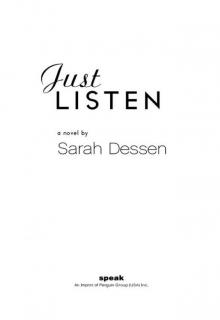 Just Listen
Just Listen Along for the Ride
Along for the Ride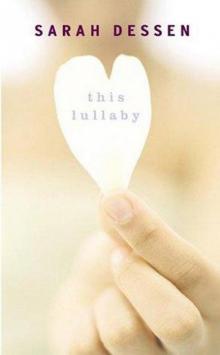 This Lullaby
This Lullaby Once and for All
Once and for All Lock and Key
Lock and Key The Truth About Forever
The Truth About Forever Someone Like You
Someone Like You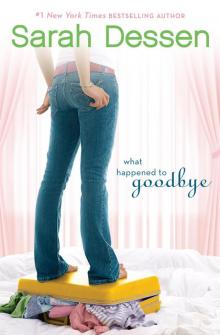 What Happened to Goodbye
What Happened to Goodbye Dreamland
Dreamland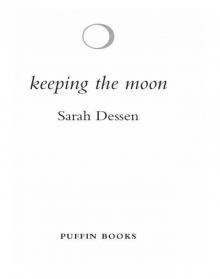 Keeping the Moon
Keeping the Moon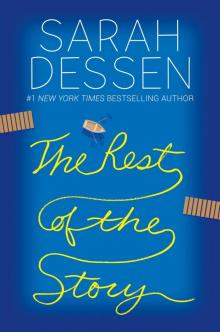 The Rest of the Story
The Rest of the Story The Moon and More
The Moon and More What Happens to Goodbye
What Happens to Goodbye